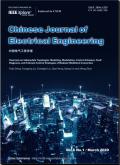Calculation of Available Transfer Capability Using Hybrid Chaotic Selfish Herd Optimizer and 24 Hours RES-thermal Scheduling
IF 3.5
Q1 Engineering
引用次数: 0
Abstract
As fossil fuel stocks are being depleted, alternative sources of energy must be explored. Consequently, traditional thermal power plants must coexist with renewable resources, such as wind, solar, and hydro units, and all-day planning and operation techniques are necessary to safeguard nature while meeting the current demand. The fundamental components of contemporary power systems are the simultaneous decrease in generation costs and increase in the available transfer capacity (ATC) of current systems. Thermal units are linked to sources of renewable energy such as hydro, wind, and solar power, and are set up to run for 24 h. By contrast, new research reports that various chaotic maps are merged with various existing optimization methodologies to obtain better results than those without the inclusion of chaos. Chaos seems to increase the performance and convergence properties of existing optimization approaches. In this study, selfish animal tendencies, mathematically represented as selfish herd optimizers, were hybridized with chaotic phenomena and used to improve ATC and/or reduce generation costs, creating a multi-objective optimization problem. To evaluate the performance of the proposed hybridized optimization technique, an optimal power flow-based ATC was enforced under various hydro-thermal-solar-wind conditions, that is, the renewable energy source-thermal scheduling concept, on IEEE 9-bus, IEEE 39-bus, and Indian Northern Region Power Grid 246-bus test systems. The findings show that the proposed technique outperforms existing well-established optimization strategies.利用混合混沌自牧优化器和 24 小时可再生能源供热调度计算可用传输能力
随着化石燃料的日益枯竭,必须探索替代能源。因此,传统的火力发电厂必须与风能、太阳能和水力发电等可再生资源共存,全天候的规划和运行技术是在满足当前需求的同时保护自然的必要条件。当代电力系统的基本要素是同时降低发电成本和提高当前系统的可用传输容量(ATC)。相比之下,新的研究报告指出,将各种混沌图与现有的各种优化方法相结合,可以获得比未加入混沌的方法更好的结果。混沌似乎提高了现有优化方法的性能和收敛性。在本研究中,自私的动物倾向(数学上表示为自私的羊群优化器)与混沌现象进行了混合,用于改善 ATC 和/或降低发电成本,从而创建了一个多目标优化问题。为了评估所提出的混合优化技术的性能,在 IEEE 9 总线、IEEE 39 总线和印度北部地区电网 246 总线测试系统上,在各种水力-热力-太阳能-风力条件下(即可再生能源-热力调度概念),执行了基于最佳功率流的 ATC。研究结果表明,所提出的技术优于现有的成熟优化策略。
本文章由计算机程序翻译,如有差异,请以英文原文为准。
求助全文
约1分钟内获得全文
求助全文
来源期刊

Chinese Journal of Electrical Engineering
Energy-Energy Engineering and Power Technology
CiteScore
7.80
自引率
0.00%
发文量
621
审稿时长
12 weeks
 求助内容:
求助内容: 应助结果提醒方式:
应助结果提醒方式:


